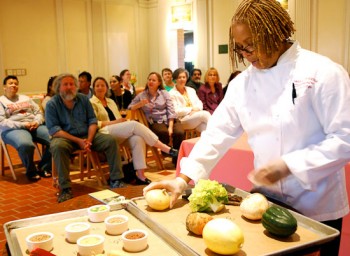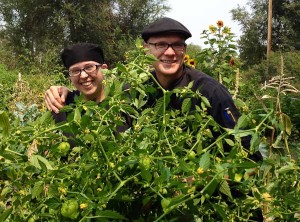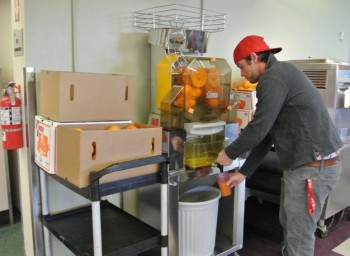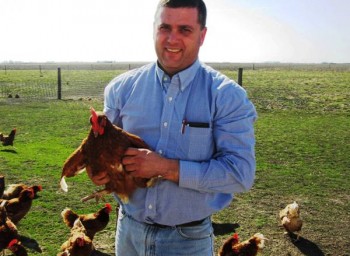As a food service company, one of the joys of working directly with college students is helping to instill a healthy eating mindset in young people who are living independently for the first time. But reaching kids at even younger ages can be helpful in preventing bad habits from really taking hold.

Blog: People
+ Blog Categories

Underdog Vegetables Shine at SCU’s Food for Your Well-Being Class
- Blog
If asked, few people might say turnips were on their Top 10 list, but mash them like potatoes with butter and milk, and what guest would turn them down? And many shy away from other lesser-known vegetables for fear of the unknown or lack of cooking knowledge, but chefs — especially lovers of local and seasonal — live for showing off many underserved vegetables and highlighting their best qualities.

Regis Goes Hyperlocal with Onsite Food Gardens
- Blog
Farm to Fork took on a whole new meaning — and a much shorter distance—this spring and summer at Regis University in Denver, as gardens planted and tended by Bon Appétit staff members yielded bounties for the kitchen.

Art Institute Hosts Bash for Chicago Charter School
- Blog
The Art Institute of Chicago hosts hundreds of high-profile events throughout the year, but one of the hottest tickets this spring was the inaugural Chef ’s Playground benefit for the Academy for Global Citizenship (AGC).

Penn’s Partnership with Local Community Kitchen Continues Strong
- Blog
Bon Appétit teams love playing a role in the communities in which we work, but supporting cooking related enterprises isn’t one we get to fill that often. That’s why the Bon Appétiters at the University of Pennsylvania in Philadelphia enjoy their partnership with the Dorrance H. Hamilton Center for Culinary Enterprises (CCE) so much.

Bon Appétit Feeds Digerati a Farm to Fork Feast for GROW Awards
- Blog
Bon Appétit Management Company doesn’t generally cater outside the campuses where we have kitchens. But when CEO Fedele Bauccio was invited to give the keynote address at a very special awards ceremony held by the Association for Corporate Growth – Silicon Valley chapter (ACG-SV) at San Jose’s Computer Science History Museum, we couldn’t possibly let the 300 Silicon Valley CEOs and executives who were attending (many of them Bon Appétit clients) dine on anyone else’s food.

First Bon Appétit/St. John’s Scholarship Recipient Graduates with Honors
- Blog
Bon Appétit Management Company is proud to partner with its education clients to tackle many mutually important issues of sustainability, such as food waste and climate change. Now, with the graduation of the first recipient of a joint scholarship at St. John’s College in Annapolis, MD, it has added greater access to higher education to the list.

Eckerd College Gets Juiced About Farm-Fresh Oranges
- Blog
Joining Eckerd students as they follow the journey oranges take from local Mixon Fruit Farms to the cup they fill at a fresh juicing station.

Nothing Like Keeping it in the Family: Farm to Fork Vendors Tom and Tim Ifft
- Blog
Bon Appétit at Wheaton college works not just with one farm in central Illinois, but an entire family of farms.

Life 101: Cooking (and Beyond) for Carleton Seniors
- Blog
Bon Appétit Registered Dietitian Jenny Pope shared information on healthy cooking, cooking for one, eating a balanced diet, and food safety tips.
